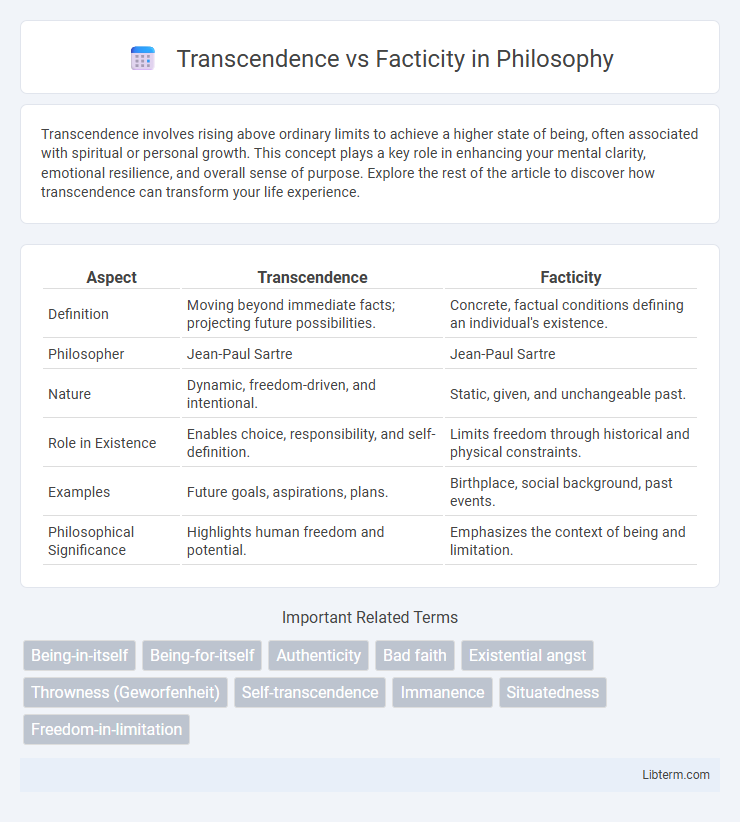Transcendence involves rising above ordinary limits to achieve a higher state of being, often associated with spiritual or personal growth. This concept plays a key role in enhancing your mental clarity, emotional resilience, and overall sense of purpose. Explore the rest of the article to discover how transcendence can transform your life experience.
Table of Comparison
| Aspect | Transcendence | Facticity |
|---|---|---|
| Definition | Moving beyond immediate facts; projecting future possibilities. | Concrete, factual conditions defining an individual's existence. |
| Philosopher | Jean-Paul Sartre | Jean-Paul Sartre |
| Nature | Dynamic, freedom-driven, and intentional. | Static, given, and unchangeable past. |
| Role in Existence | Enables choice, responsibility, and self-definition. | Limits freedom through historical and physical constraints. |
| Examples | Future goals, aspirations, plans. | Birthplace, social background, past events. |
| Philosophical Significance | Highlights human freedom and potential. | Emphasizes the context of being and limitation. |
Understanding Transcendence: Beyond the Immediate
Understanding transcendence involves recognizing human capacity to surpass immediate circumstances and project possibilities beyond present facticity. It highlights consciousness as an active, future-oriented force shaping meaning rather than being confined by existing conditions. This concept underscores freedom, intentionality, and the continuous redefinition of the self beyond the given reality.
Defining Facticity: Grounded in Reality
Facticity refers to the concrete details and conditions that define an individual's existence, including past experiences, physical environment, and social context. It grounds human reality in identifiable constraints that shape possibilities but do not determine choices entirely. Emphasizing facticity highlights the immutable aspects of being that coexist with freedom in existential philosophy.
Philosophical Roots: Existentialism and Beyond
Transcendence and facticity are foundational concepts in existentialist philosophy, especially in the works of Jean-Paul Sartre, who defined transcendence as the human capacity to surpass given facticity--our concrete, unchangeable circumstances. Facticity encompasses the immutable aspects of existence, such as physical traits, past events, and social conditions that define one's situation, while transcendence represents freedom, choice, and the ongoing projection of the self into possibilities beyond these constraints. These ideas extend beyond existentialism into phenomenology and post-structuralism, influencing contemporary debates on subjectivity, freedom, and the nature of human agency.
Human Existence: Navigating Transcendence and Facticity
Human existence is defined by the dynamic interplay between transcendence, the capacity for self-overcoming and projecting future possibilities, and facticity, the concrete realities of one's situation and limitations. Navigating this tension requires embracing the freedom to define meaning within the constraints imposed by history, culture, and personal circumstances. This balance shapes authentic being, where individuals continuously negotiate between their projected potential and the given facts of their existence.
Freedom and Constraint: The Dynamic Tension
Transcendence represents the human capacity for freedom, enabling individuals to project beyond their current situation and create meaning, while facticity embodies the concrete limitations and conditions that constrain this freedom. The dynamic tension between transcendence and facticity highlights the continuous negotiation between freedom and constraint, where individuals must navigate predetermined facts without being wholly determined by them. This interplay is central to existentialist thought, emphasizing that true freedom arises not from the absence of constraints but from the conscious engagement with and transformation of one's factical circumstances.
Authenticity: Embracing Possibility and Limitation
Authenticity arises from balancing transcendence--the pursuit of future possibilities--and facticity--the acceptance of current limitations. Embracing this duality enables individuals to navigate freedom responsibly while grounding choices in real-world constraints. This dynamic tension fosters genuine selfhood by integrating potentiality with the unchangeable facts of existence.
Transcendence in Everyday Life
Transcendence in everyday life involves the constant ability to project oneself beyond current situations, enabling individuals to envision and pursue future possibilities and self-defined goals. This dynamic process reflects human freedom and creativity, where one actively shapes personal meaning and identity despite the constraints of facticity, such as past experiences and external circumstances. Engaging in transcendence empowers people to transform their lived reality by prioritizing authentic choices and attitudes over deterministic conditions.
Facticity’s Impact on Personal Identity
Facticity profoundly shapes personal identity by grounding individuals within the context of their historical, cultural, and social circumstances. It encompasses the fixed conditions--such as birthplace, language, and past experiences--that limit absolute freedom yet provide a framework for self-understanding. The tension between facticity and transcendence highlights how identity emerges through navigating these given constraints while exercising freedom to define oneself.
Resolving the Paradox: Integration or Opposition?
Transcendence and facticity represent core existential concepts defining human freedom and limitation, where transcendence refers to the ability to project oneself beyond given circumstances, and facticity encompasses the immutable conditions of existence. Resolving the paradox involves exploring whether these notions must be integrated--acknowledging facticity without surrendering freedom--or upheld in opposition, emphasizing the tension between determinism and agency. Philosophers like Sartre advocate for integration, arguing that embracing facticity enriches transcendence by grounding existential choices within concrete realities.
Modern Perspectives: Relevance in Contemporary Thought
Modern perspectives on transcendence versus facticity emphasize the dynamic interplay between human freedom and the constraints of existence, highlighting existentialist themes from thinkers like Jean-Paul Sartre and Simone de Beauvoir. Contemporary thought explores how transcendence empowers individuals to project meaning and possibilities beyond their factical conditions, influencing debates in phenomenology, postmodernism, and critical theory. This discourse remains relevant in addressing issues of identity, agency, and socio-political structures in a rapidly changing world.
Transcendence Infographic

 libterm.com
libterm.com